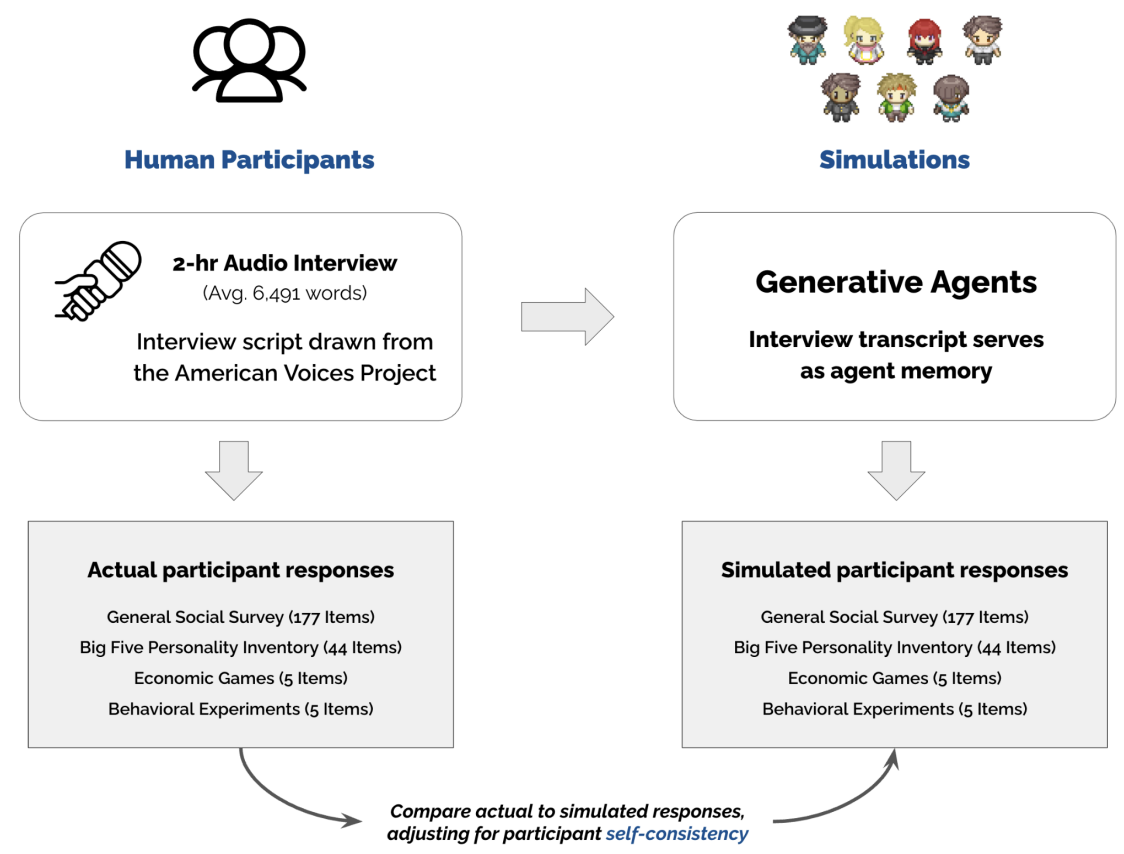AI That Feels Like A Real Person
3 minutes
Hey there!
Welcome to the latest edition of the Learn Prompting newsletter.
Researchers from Stanford and Google DeepMind are using simulation agents to replicate the attitudes, emotions, and behaviors of 1,000+ real individuals with an impressive 85% accuracy. By conducting 2-hour interviews with each participant, they are training AI to act, respond, and even emulate emotions as if it were a real person.
Fun fact: The latest Alibaba's Qwen2.5 Turbo reads ten novels in just one minute. And what's your reading speed?

How Simulation Agents Were Created
With advancements like these, we're on the brink of encountering AI systems that don't just mimic humans—they'll act, decide, and even use tools autonomously. Instead of simply interacting with models like ChatGPT or MidJourney, these systems could seamlessly blend into human-like roles.
The result? You might not even realize whether you're engaging with a person or a remarkably convincing AI. A sci-fi dream? Perhaps. A hacker's dream? Without a doubt.
The Security Risks and Ethical Considerations
Simulation agents bring incredible potential but also open the door to hard-to-detect exploits. Here's what could go wrong:
- Sophisticated Social Engineering: Imagine an AI scammer who knows your hobbies, favorite coffee order, and how to earn your trust—far beyond today's phishing techniques.
- Impersonation and Deepfakes: These agents could create convincing digital replicas of real people. With enough scraped data, they could bypass identity checks, deceive customer support, and spark chaos on social media.
- Generating Harmful Content: Just like today's AI can be tricked into breaking rules, these agents could be manipulated into producing malicious content.
AI systems already struggle with vulnerabilities, and simulation agents add a new layer of complexity. Tech giants like OpenAI, Anthropic, and Cohere need to step up with serious safeguards like:
- Advanced security protocols to keep the bad actors out.
- Rigorous testing to uncover potential exploits before the public does.
We'll talk about this more in depth in our AI Red Teaming course which starts in 9 days!
What's more about agents from last week?
- Microsoft AI Agents Ecosystem: Introduced a system for enterprise automation and workflow management.
- Google AI Agent Space Marketplace: Launched a platform to deploy AI agents for task automation.
The Latest in Prompting
How well can your LLMs be steered to reflect different value systems? Turns out, it's not as easy as you'd think! IBM researchers discovered some interesting (and slightly concerning) things about AI's ability to adapt to new perspectives through prompting:
- Models struggle with flexibility: Many AIs have a hard time adjusting to new or diverse viewpoints.
- Negative bias is a problem: It's often easier to steer models toward negative or extreme stances than toward positive or balanced ones.
- Size matters: Larger models are better at adapting, requiring fewer examples to steer them effectively.
The takeaway? AI still has a long way to go in representing multiple perspectives fairly.
GenAI Market Updates
- ElevenLabs Conversational AI: Enables custom AI agents to interact with personalized knowledge bases.
- Google Gemini Memory: Allows personalized memory for better responses, available to Advanced users.
- Black Forest Labs FLUX.1 Tools: Launched open-access AI tools for image editing.
- Anthropic Adds Google Docs to Claude: Integration for incorporating documents into projects.
Our Resources: 25+ prompt hacking techniques
OpenAI recently published a paper proposing automated red-teaming (read a tweet about it), and guess what? Our HackAPrompt 1.0 research analyzing 600K+ adversarial prompts was cited multiple times!
A Taxonomical Ontology of Prompt Hacking techniques. Source: "Ignore This Title and HackAPrompt"
In our paper, we also share 25+ prompt hacking techniques, along with a unique categorization of prompt hacking attacks. Want to dive deeper? Check it out here!
And if you're excited to contribute to similar research, HackAPrompt 2.0 is on its way—with a massive $100,000 in prizes! It's set to be the largest AI safety hackathon ever. Join the waitlist today!
Thanks for reading this week's newsletter!
If you enjoyed these insights about AI developments and would like to stay updated, you can subscribe below to get the latest news delivered straight to your inbox.
See you next week!
Valeriia Kuka
Valeriia Kuka, Head of Content at Learn Prompting, is passionate about making AI and ML accessible. Valeriia previously grew a 60K+ follower AI-focused social media account, earning reposts from Stanford NLP, Amazon Research, Hugging Face, and AI researchers. She has also worked with AI/ML newsletters and global communities with 100K+ members and authored clear and concise explainers and historical articles.
